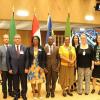News
Displaying Results 26 - 50 of 162
At the World Economic Forum Annual Meeting in Davos, UNECE Executive Secretary Tatiana Molcean highlighted the role of UNECE’s legal instruments, standards and tools in dealing with the most pressing global challenges, namely climate change, digital and green transformations, low-carbon energy…
Originally introduced in policy and development discussions in 2011, the water-food-energy-ecosystem nexus approach has evolved into a pivotal framework for sustainable development and achieving the Sustainable Development Goals (SDGs).
Work on the water-energy-food-ecosystems nexus under the…
Trade facilitation is a potent instrument that can multiply the benefits of trade. Beyond direct impact on economic growth through higher trade flows linked to improved efficiency at the borders, trade facilitation reforms can also contribute to other policy goals. For example, through the…
Cooperation and management of transboundary waters, which span over 45% of the world's surface and serve as vital resources for nearly half of the global population, face the imminent threat of underfunding. The last reporting exercise on Sustainable Development Goals (SDG) indicator 6.5.2 (2020),…
According to a recently published UNECE Policy Paper, the agrifood, the garment and footwear and the mineral sectors contribute significantly to the economic growth and employment in the UNECE region, while being major sources of global greenhouse gases (GHG) and environmental pollution. Evidence…
UNECE and partners are working together to support North Macedonia in its green energy transition by building capacities to finance energy efficiency (EE) and renewable energy (RE) projects.
To this end, UNECE and UNDP organized two training sessions on design and verification of energy…
In the UNECE region, the Fourth Cycle of Environmental Performance Reviews (EPR) kicks off with the review of Tajikistan, carried out for the fourth time under the leadership of UNECE.
A large, multidisciplinary team of international experts worked in Dushanbe from 6 to 15 November 2023,…
As countries seek to rapidly decarbonize their economies, investing in energy efficiency and the improved performance of buildings offers significant near term gains. Available measures can help transform the building and construction sector, which today is responsible for approximately 40% of…
The European Commission has proposed a new legislation, the European Critical Raw Materials Act, to ensure a secure and sustainable supply of critical raw materials for the EU. The Act, on which the European Parliament and the European Council reached a provisional agreement on 13 November,…
Strong private sector engagement positively impacts the relevance, legitimacy, and credibility of national trade facilitation bodies (NTFBs) and encourages a business-centric approach to trade facilitation. Over the past several years, governments, donors and international organizations have…
Policy solutions for pressing problems like air pollution require sound data. Emission inventories can help in determining the major sources of air pollution in a given country.
As a result of integrated air pollution management strategies developed under the UNECE Convention on Long-range…
In the pan-European region, citizens are feeling the impacts of climate change through extreme weather events. This undermines equitable access to water and sanitation as human rights, due to increasing water scarcity and increased burden of water diseases due to overflow of untreated sewerage…
Transboundary rivers, lakes, and aquifers play a vital role in supporting the livelihoods of billions of people worldwide. Roughly 60% of global freshwater flow is in shared basins. About 40% of the world’s population lives in shared basins. The development and management of transboundary water…
Understanding how pollutant emissions will evolve in the future is essential for designing effective clean air policies today while taking into account the available resources in a given country.
While air quality in the UNECE region has improved over the past few decades as a result of…
Central Asia has significant untapped potential to decarbonize its energy systems and accelerate the sustainable energy transition, including through renewable energy development and enhanced resource management. To help the region capitalize on these opportunities, UNECE, the United Nations…
Almost all of Botswana’s territory sits within transboundary rivers basins. Although landlocked, Botswana is therefore a ‘water-linked’ country. The Cubango-Okavango, Limpopo, Orange-Senqu and Zambezi Rivers all provide crucial freshwater arteries that supply people and nature, including the…
UNECE support for the revision of the Georgian Mining Code Act is shaping the future of resource classification and estimation standards in Georgia. During a workshop in Tbilisi participants discussed how Georgian standards could play a crucial role in harmonizing with the global dimensions of the…
An estimated 3.6 billion people face inadequate access to water at least a month per year – a figure expected to increase to more than 5 billion by 2050. According to WMO, over 50% of global catchment areas and reservoirs displayed deviations from normal conditions in 2022, of which the majority…
The ongoing repercussions of the COVID-19 pandemic, geopolitical instability, and elevated inflation rates continue to pose challenges to global trade, with the World Trade Organization (WTO)'s trade growth forecast now estimated at only 0.8% this year.
As the global trade landscape grapples…
Sound emission inventories are the first step for designing effective clean air policies as they provide information about the main sources and the most acute air pollution problems in a country.
Under the Convention on Long-range Transboundary Air Pollution (Air Convention), UNECE has therefore…
In the Drina River Basin, shared mainly by Bosnia and Herzegovina, Montenegro and Serbia, working together across borders and jointly addressing water and energy challenges is a key part of effective climate action and the green transition.
As part of the Sarajevo Energy and Climate Week (25-29…
Taking up some of the main results of the recent review report, which assessed the effectiveness of the amended Protocol to Abate Acidification, Eutrophication and Ground-Level Ozone (Gothenburg Protocol) under the UNECE Convention on Long-range Transboundary Air Pollution, experts discussed…
Breathing clean air is a necessity for everyone and decent air quality is a shared responsibility that can only be achieved if we work together. This is what Member States in the UNECE region realized 45 years ago, when they started negotiating the first multilateral, legally binding treaty to cut…
UNECE and partners have started implementation of a multi-year project on “Improving the energy efficiency of the global building supply chain industry and its products to deliver high performance buildings” (full project budget EUR 19.8 million), funded by the International Climate Initiative (IKI…
Bringing together countries to share progress and experience on how to effectively manage their shared waters is a key characteristic of the Water Convention. Cooperation for the management of transboundary waters to promote sustainability, peace and security is the Convention’s mantra - especially…
























